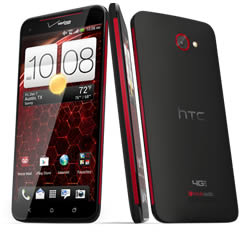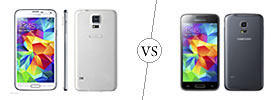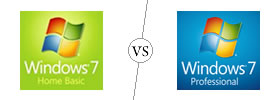Difference between LG Optimus G Pro and HTC Droid DNA
Key Difference: LG Optimus G Pro has major updates to its predecessor, the LG Optimus G. The device sports a massive 5.5-inch True Full HD IPS touch screen with multi-touch capability and a pixel density of 401 ppi. Under the hood, the phone is powered by 1.7 GHz Quad-core Snapdragon 600, making it pretty fast and speedy. The HTC Butterfly is a high-end phone by the HTC Corporation. The HTC Butterfly is sold in four variants: Droid DNA; J Butterfly HTL21; Butterfly X920d; and Butterfly X920e. They are all powered on a Quad-core 1.5 GHz Krait processor. The HTC Droid has the Quadcomm MDM615m, while the Butterfly variants have the Qualcomm APQ8064 chipset. They all have 2 GB of RAM.
 Since smartphones have become the ‘most important’ device in people’s lives, every smartphone company has been constantly in R&D to try and manufacture new phones with new features to capture the market. LG Electronics is one such company that has been releasing phones in various sizes, trying to boost its product portfolio to draw in customers. LG has been specially giving Samsung direct competition by releasing similar phones within the same time frame. The LG Optimus G Pro is the successor to the original LG Optimus G and resembles the Samsung Galaxy Note II in size and features. The phone has already been announced and launched in Korea, with launch date yet to be released for the rest of the world.
Since smartphones have become the ‘most important’ device in people’s lives, every smartphone company has been constantly in R&D to try and manufacture new phones with new features to capture the market. LG Electronics is one such company that has been releasing phones in various sizes, trying to boost its product portfolio to draw in customers. LG has been specially giving Samsung direct competition by releasing similar phones within the same time frame. The LG Optimus G Pro is the successor to the original LG Optimus G and resembles the Samsung Galaxy Note II in size and features. The phone has already been announced and launched in Korea, with launch date yet to be released for the rest of the world.
The LG Optimus G Pro has major updates to its predecessor, the LG Optimus G. The device sports a massive 5.5-inch True Full HD IPS touch screen with multi-touch capability and a pixel density of 401 ppi. The screen is truly amazing in viewing and the bigger screen is perfect for multi-purpose use (things people usually whip out their tablets or laptops for). The high resolution ensures crisp and sharp images, while the phone has great viewing angles. The large screen also ensures that the device is hard to hold and function with one hand. The G Pro has a sleek plastic chassis, which makes it a slippery when trying to maneuver single-handedly. However, the plastic chassis does not make the phone weak; in fact it is very resilient. LG has made it a bit easier by placing the power and the volume buttons on the right side of the device, rather than placing the power button on the top. Operating the phone requires the person holds the phone in one hand and operates using the other.
Under the hood, the phone is powered by 1.7 GHz Quad-core Snapdragon 600, making it pretty fast and speedy. The device can handle running multiple operations as well as high-res games, without major glitches. The device offers internal memory capacity of 32 GB, which can be expanded further using the microSD slot by 64 GB. The device provides 2 GB worth of RAM, decreasing the lagging effect when running too many apps. The device comes with an NFC, Infrared port, USB and Wi-Fi hotspot capability. The Infrared port ensures that the phone can be made into a remote for any supporting device, while the hot-spot allows the person to share internet with others.
The device houses a 13 MP primary camera for picture taking that supports 4208 x 3120 pixels, and a 2.1 MP secondary camera for video conferencing or calls. The camera is pretty decent in terms of taking hi-res, sharp photos, however, according to The Verge review; the camera has a tendency of washing out colors from the images. The huge viewfinder on the device is great for taking images. Both the cameras have the ability to take videos at 1080p@30fps. One pretty nifty feature on the phone is the Dual-recording feature (similar to the one on the S4), which allows the user to record videos simultaneously from both of the camera. Another feature that is boasted by the company is the Virtual Reality Panorama shot that allows the user to take images and stitch them together for 360 degree panorama shots (this feature is very similar to the Photo Shoot on the Nexus 4).
The device houses a massive Li-Po 3140 mAh battery that is removable, a must feature for many smartphone lovers. The company has yet to release the official data about the Talktime and the Stand-by time offered by the phone. LG has also added the QSlide apps and the QButton feature on the phone. The QSlide apps are widgets that allow the user to do multiple jobs on the same screen, such as take notes, see the calendar, check e-mail and can also allow the user to watch a video and text at the same time. A similar feature is available in the Note II, but it the system only allows the user to access limited apps on the phone. The QButton located on the left side of the device allows the user to access any apps on the phone by pressing the button. The device is yet to hit other shores and prices will also be announced accordingly with the release dates.

The HTC Butterfly is a high-end phone by the HTC Corporation. The phone has been quite popular all over the world; however, most people don’t know exactly how popular the phone has actually been. This is mainly because not many people know that the HTC Butterfly and HTC Droid DNA is actually pretty much the same phone, with only a few differences. The differences are only there to make the phone more regional specific.
The HTC Butterfly is sold in four variants: Droid DNA in the United States on the Verizob Network; J Butterfly HTL21 in Japan on KDDI's au network; Butterfly X920d in Taiwan, South East Asia and India; and Butterfly X920e in China and Russia.
All the variants have most of the same features. They are all powered on a Quad-core 1.5 GHz Krait processor. The HTC Droid has the Quadcomm MDM615m, while the Butterfly variants have the Qualcomm APQ8064 chipset. They all have 2 GB of RAM and Adreno 320 graphics processor. They all have an 8 MP primary camera and a 2.1 MP secondary front facing camera. The display is a 5 inch Super LCD3 capacitive touchscreen with Corning Gorilla Glass 2. At the time of the launch the phone was the second phone in the market to feature a 1080p display. The phone has Android version 4.1, but is upgradable to Android 4.2.
The HTC Droid DNA differs from the other variants, in that it supports wireless charging, but lacks a MicroSD slot. The Droid DNA and the J Butterfly both support CDMA and LTE connections, as well as UMTS. However, only the Droid DNA comes with quad band UMTS radio. The X920d and X920e, on the other hand, do not even have LTE support. There are also some subtle differences regarding color accents, buttons and logo placement. However, these are minor and so not affect the phones.
The information for the detailed table about the two phones has been taken from theverge.com, engadget.com, HTC website and GSMArena.com.
|
|
LG Optimus G Pro |
HTC Butterfly (HTC Droid DNA) |
|
Launch Date |
Q2/2013 |
November 2012 |
|
Company |
LG |
HTC |
|
Size |
150.2 x 76.1 x 9.4 mm |
143 x 70.5 x 9.1 mm (5.63 x 2.78 x 0.36 in) |
|
Display |
5.5 inches True Full HD IPS Plus LCD capacitive touchscreen |
5.0 inches Super LCD3 capacitive touchscreen, 16M colors |
|
Screen |
1080 x 1920 pixels (~401 ppi pixel density) |
1080 x 1920 pixels (~441 ppi pixel density) |
|
Protection |
N/A |
Corning Gorilla Glass 2 |
|
Weight |
172 grams |
141.7 g (4.97 oz) |
|
2G Network |
GSM 850 / 900 / 1800 / 1900 |
GSM 850 / 900 / 1800 / 1900 or CDMA 800 / 1900 |
|
3G Network |
HSDPA 900 / 2100 |
HSDPA 850 / 900 / 1900 / 2100 or CDMA2000 1xEV-DO |
|
4G Network |
Depends on market availability |
LTE 700 (market dependent) |
|
GUI |
LG Optimus UI |
HTC Sense UI 4+ |
|
CPU speed |
1.7 GHz Quad-core Snapdragon 600 |
Quad-core 1.5 GHz Krait |
|
GPU |
Adreno 320 |
Adreno 320 |
|
OS |
Android v4.1.2 (Jelly Bean) |
Android OS, v4.1 (Jelly Bean), planned upgrade to v4.2 (Jelly Bean) |
|
Chipset |
Qualcomm APQ8064T Snapdragon 600 |
Qualcomm Snapdragon MDM615m or APQ8064 |
|
RAM |
2 GB |
2 GB RAM |
|
SIM Size |
microSIM |
Micro-SIM |
|
Internal Memory |
32 GB |
16 GB (11 GB user available) |
|
Expandable Memory |
Up to 64 GB |
microSD, up to 32 GB (Market dependent) |
|
Sensors |
Accelerometer, gyro, proximity, compass |
Accelerometer, gyro, proximity, compass |
|
Connectivity |
2G, 3G, 4G, Wi-Fi, Bluetooth, NFC, Infrared port, DLNA, Wi-Fi hotspot, USB, USB Host. |
3.5 mm stereo audio jack, NFC capable, Compliant with Bluetooth 4.0 BLE, Wi-Fi: 802.11 a//b/g/n, micro-USB 2.0 (5-pin) port |
|
Data |
GPRS, EDGE, WLAN, Bluetooth, NFC, Infrared port, USB. |
GPRS, EDGE, WLAN, Bluetooth, USB, NFC (Market dependent). |
|
Speed |
HSDPA, HSUPA, LTE |
HSPA, EV-DO Rev. A, up to 3.1 Mbps; LTE, Cat3, 50 Mbps UL, 100 Mbps DL |
|
WLAN |
Wi-Fi 802.11 a/b/g/n/ac, dual-band, Wi-Fi Direct, DLNA, Wi-Fi hotspot |
Wi-Fi 802.11 a/b/g/n, Wi-Fi Direct, DLNA, Wi-Fi hotspot |
|
Bluetooth |
Bluetooth v4.0 with A2DP |
Yes, v4.0 with A2DP |
|
USB |
microUSB v2.0 (MHL), USB Host |
Yes, microUSB v2.0 (MHL) |
|
Primary Camera |
13 MP, 4208 x 3120 pixels |
8 MP, 3264x2448 pixels, autofocus, LED flash |
|
Secondary Camera |
2.1 MP, 1080p@30fps |
2.1 MP, 1080p@30fps |
|
Video |
1080p@30fps Dual-video recording HDR |
1080p@30fps, stereo sound rec., video stabilization |
|
Camera Features |
|
|
|
Sound Enhancement |
Dolby mobile sound enhancement |
Built-in headset amplifier and dedicated amp for the external rear-speaker, Beats Audio |
|
Audio supported formats |
MP3/ WMA/ WAV/ FLAC/ eAAC+/ AC3 player |
MP3/eAAC+/WMA/WAV player |
|
Video supported formats |
MP4/ H.264/ H.263/ WMV/ DviX player |
DivX/XviD/MP4/H.263/H.264/WMV player |
|
Battery Capacity |
Removable Li-Po 3140 mAh |
Non-removable Li-Ion 2020 mAh battery |
|
Talktime |
No official data released |
Up to 353 hours |
|
Standby Time |
No official data released |
Up to 12 hours 40 min |
|
Available Colors |
Black, White |
Black |
|
Messaging |
SMS(threaded view), MMS, Email, Push Mail, IM, RSS |
SMS (threaded view), MMS, Email, Push Email |
|
Browser |
HTML5, Adobe Flash |
HTML5 |
|
Radio |
Stereo FM radio with RDS |
- |
|
GPS |
GPS with A-GPS support and GLONASS |
Yes, with A-GPS support and GLONASS |
|
Java |
Java MIDP emulator |
Yes, via Java MIDP emulator |
|
Additional Features |
|
|
Image Courtesy: engadget.com, htc.com









Add new comment